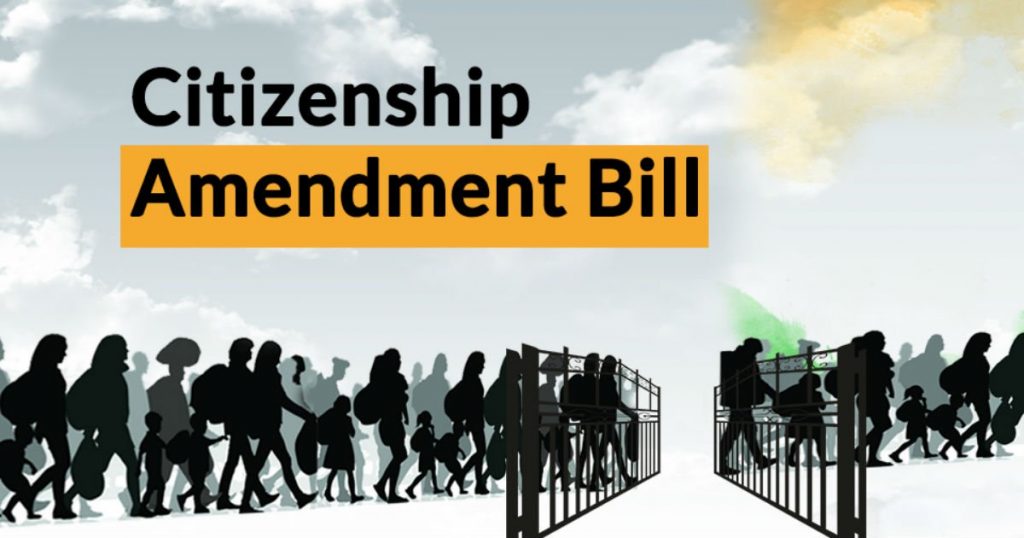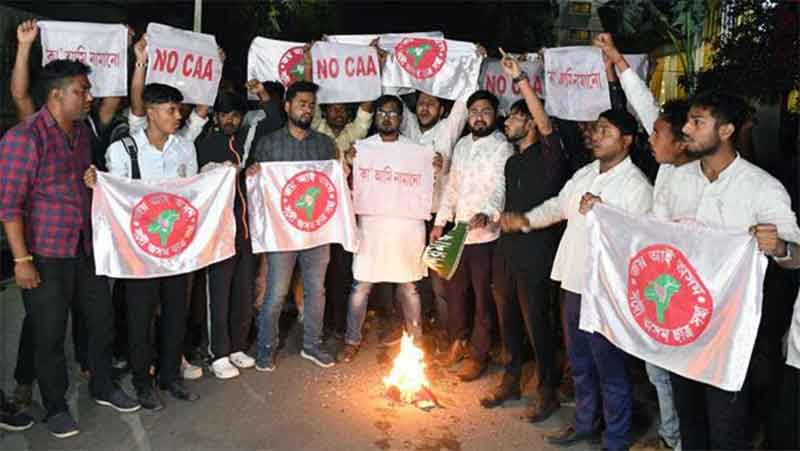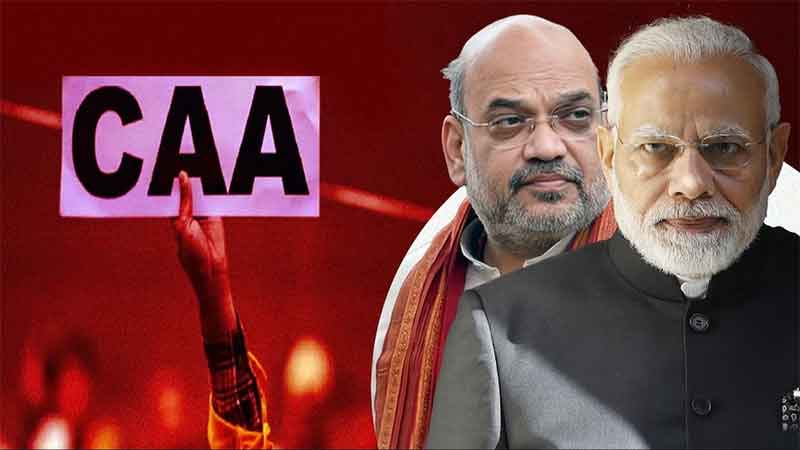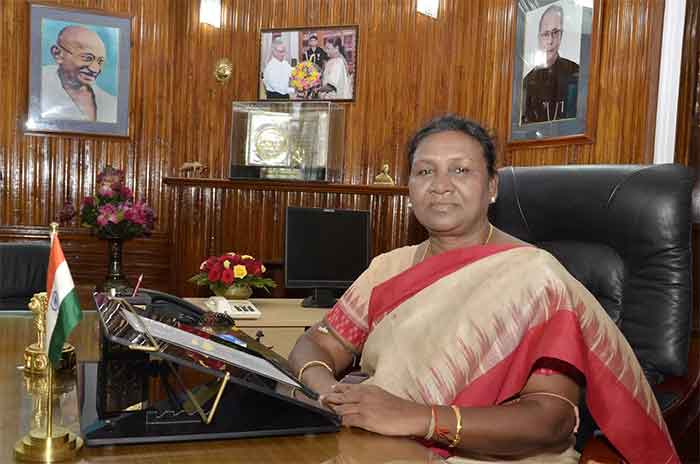
At a time when Delhi was burning in the fire of communal riots sparked by the provocative speeches of leaders of his own party as evident from video reports, it was ironical that Prime Minister Narendra Modi should have invited President Trump to visit, of all places, Sabarmati, the ashram where Gandhi prayed for peace and non-violence – the very concepts that were being violated on the same day by Modi’s devotees in the streets and lanes of north-east Delhi. Can there be any worse example of hypocrisy ?
Prime minister Modi himself has acknowledged that he had been trained as an RSS activist in its shakhas.’ It is well known that theseshakhas’ teach their pupils to valorize Gandhi’s killer, Nathuram Godse – who continues to be worshipped as an icon of Hindutva by the followers of the ruling BJP in different parts of India. As a prime minister presiding over a secular state, should he be not honest enough to break out from his partisan RSS shackles, and reach out to the protesters in Shaheen Bagh in Delhi, and other parts of India ? It is a futile hope. Given the Sangh Parivar’s visceral anti-Muslim bias, and the intolerance against any social or political protests raised by secular organizations which embrace all religious communities, there is little hope that the dyed in the wool disciple of the Parivar will ever break out from his roots, and emerge as a prime minister committed to Gandhian values – however much he may parade his devotion to them by taking Trump on a tour at Sabarmati.
Reminding Modi of Gandhi
Our honourable Prime minister and his colleague, the Home minister, both having been brought up in the RSS `shakhas’ in their youth, are not expected to be aware of Gandhi’s role in fighting a repressive colonial citizenship Act in South Africa way back more than a century ago. One should forgive them for their obliviousness of that historical fact. But curiously enough, their government has enacted the recent citizenship legislative measures like NCR (National Citizenship Register) and NPR (National Population Register), the provisions of which ominously echo the clauses of the Asiatic Registration Act of 1906 enacted by the apartheid British colonial regime in South Africa – against which Gandhi launched his first civil disobedience movement outside India. Do we then suspect that the present bureaucrats in the PMO (Prime Minister’s Office) and the Home Minister’s office who drafted NCR and NPR, could have dug into the old archives and discovered the provisions of that racist colonial Act, and selectively incorporated them into NCR and NPR to suit the interests of their present rulers ? We never know. May be a few decades later, some of these bureaucrats after their retirement will write memoirs (a habit in which they indulge) and reveal the secret official drafts which they had drawn to enact them into legislative measures – which were to prove disastrous later for Indian citizens.
But, coming down to the present times, lest I be accused of peddling a conspiracy theory,’ I may point out the similarities between certain provisions of the Asiatic Registration Act of 1906 and those of NCR and NPR . To go back to the 1906 Act of South Africa, it required every Indian man, woman and child of eight year or upwards entitled to reside in the Transvaal (where most of the South Asians lived) to register his or her name and take out a registration. The registrar was to note down important marks of identification and take his/her finger and thumb impression. Does it not remind us of our tortuous experiences with the Aadhaar process of verification ? Under that colonial Act, every Indian who failed to apply for registration, and meet the requirements, was to forfeit the right to residence. Failure to apply was also held as an offence in law for which the defaulter could be fined, sent to prison, or even deported with the discretion of the court. That provision again finds echo in the NCR (National Citizenship Register), under which some one million inhabitants of Assam have been declared non-citizens, many among whom have been branded asdoubtful’ and sent to prisons in the form of `detention camps.’ Today, similar suffocating experiences of the Transvaal Indians of a colonial state in 1906 are being suffered by Indian citizens of an independent India. The same colonial bureaucratic mechanisms which were insensitive to the plight of the rural poor and common citizens (who can never produce documents to prove their citizenship), are being replicated in the current exercises carried out under CAA, NCR and NPR.
To go back to that past of South Africa, it was a young Indian lawyer living there, who launched a movement against the draconian Asiatic Registration Act. Mohandas Karamchand Gandhi urged the Indian inhabitants to resist the racist law, in the name of Satyagraha.’ On May 11, 1907, he announced the campaign for non-cooperation with the colonial administration against theBlack Act’ – the term to denounce the Asiatic Registration Act – urging them not to register under that Act . Among the majority of Indian residents of Transvaal who responded to Gandhi’s call were poor Indian hawkers, middle class professionals and men and women of all faiths, who refused to give their finger print impressions. Over 2000 Indians defied the Black Act and went to prison, including Gandhi himself. The exchanges between the British judge Jordan and Gandhi during his trial in Transvaal in 1908 make interesting reading which has relevance for what is happening in India today in the context of the anti-CAA.NCR.NPR agitations. Jordan asked Gandhi: “The question is, have you registered (under the Act) or not ?…There is the law, which has been passed by the Transvaal legislature and sanctioned by the Imperial Government….What you want to say, I suppose, is that you do not approve of the law and you conscientiously resisted it.” The young Gandhi’s immediate cryptic reply was: “That is perfectly true.” When he refused to comply with judge Jordan’s order to leave the colony within forty-eight hours, Gandhi was sentenced to two months imprisonment.
Following seven years of struggle, during which thousands of Indian protestors were flogged, jailed and gunned down by the British colonial administration, General Jan Christian Smuts, the English minister for defence and native affairs in the South African administration led by Louis Botha, decided to come to a deal with Gandhi. The doors of the British colonial administration, if not open, were ajar a bit, to allow voices to reach t.he ears of the rulers. Are the doors of the present Modi government even ajar to listen to voices of dissent and protest ?
The Gandhi-Smuts agreement of January 30, 1914 led to the withdrawal of Satyagraha’, and the passing of the Indian Relief Bill which acceded to all the demands of theSatyagraha’ protesters. Although it took Gandhi and his followers seven years to undo the racist Asiatic Registration Act and restore the rights of Indian inhabitants of South Africa, we should also note that the British colonial rulers finally agreed to enter into a dialogue with their Indian opponent and withdraw the discriminatory and oppressive legislation. Before that, they decided to sentence Gandhi to a mere two months imprisonment – in contrast with the vicious and vindictive policies of the present regime in India to sentence political opponents to years of incarceration under draconian laws. The then British administration perhaps still retained an iota of the liberal tradition of recognizing the moral strength of dissidents and political opponents, and negotiate with them in the civilized surroundings of dialogues – as evident from the several such Round Table talks held between Gandhi and the colonial rulers all through the tumultuous years of our freedom movement. Besides, the British administrators in India could not get away with their oppressive acts in their colony, since they were held accountable by the British parliament and the judiciary in their home – some among whom were punished according to the prevailing norms of the British justice system.
Disappearance of civilized norms in public propaganda by political parties, and defiance of accountability norms in the acts of the official agents of the state
Such civilized surroundings have disappeared from present day India. While the present regime is deriving inspiration from oppressive laws passed by the British colonial administration, in order to frame new legislative bills and acts like CAA, NPR and NRC, it refuses to take lessons from the same British colonial administration which used to enter into discourse with its opponents. Till now, the Modi-led government has not made any gesture by sending its emissaries to engage in a dialogue with the octogenarian and nonagenarian women who had been protesting against CAA, NPR and NRC at Shaheed Bagh for months. It shows the insensitivity of the government to public sentiments.
Added to this administrative insensitivity is the communal propaganda unleashed by leaders and activists of the ruling party against the peaceful satyagraha’ in Shaheed Bagh and parts of north-eastern Delhi that brought together people of all faiths in a massive demonst.ration of protest against CAA, NCR and NPR. Describing them asanti-national’, BJP leaders like Kapil Mishra, Anurag Thakur, Parvesh Verma and Abhay Verma in their public speeches during the last weeks urged their followers to force these protesters out from their sites of protest. Video clips of their speeches have been produced in the Delhi High Court, which has recommended an FIR against Kapil Mishra. It is these provocative speeches that sought to communalize a secular protest movement against CAA, NCR and NPR into a Hindu-Muslim confrontation. Attacks on such protests by the BJP-supported hooligans in JNU, Jamia Milia, Aligarh and other educational institutions have antagonized the Muslim youth – some among whom may have taken up arms as the last resort to protest, as evident from the shot of a Muslim youth targeting his pistol against a policeman in a video-clip during the recent Delhi riots. Let that not be projected as an only icon of protest against the CAA-NCR-NPR oppressive measures, since there are other video-clips that show Hindu youths also protesting against them. The peaceful mass demonstrations against these measures in Shaheen Bagh and other cities recall Gandhi’s `Satyagraha’ in Transvaal more than hundred years ago. The then British colonial government there conceded to the demands of their Indian subjects. But are the present rulers of India politically civilized enough to enter into a dialogue with their subjects and concede to their demands ?
Sumanta Banerjee is a political and civil rights activist and social scientist. Email: [email protected]
SIGN UP FOR COUNTERCURRENTS DAILY NEWS LETTER













































